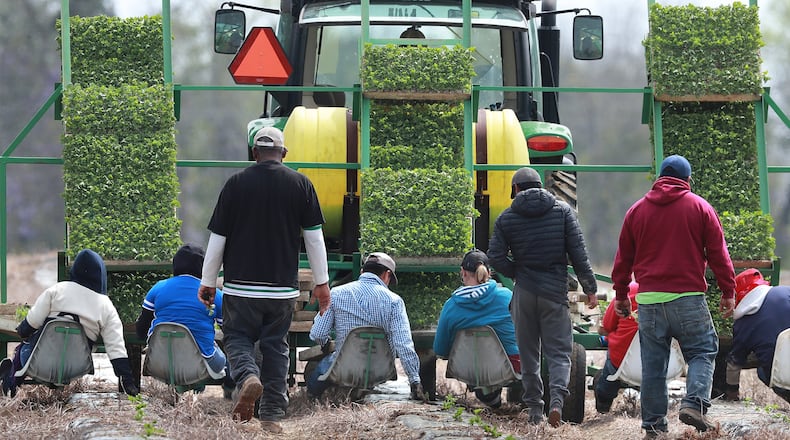Georgia has teamed up with a coalition of Republican-led states – and with a group of Georgia growers – to halt a new federal rule that would bring expanded protections to migrant farmworkers on temporary visas.
The new rule, currently set to go into effect this summer, reinforces that farmers are prohibited from holding or confiscating workers’ passports, and requires that vehicles used to transport workers be equipped with seat belts. It also allows workers to invite guests to their employer-provided housing – in the H-2A migrant farmworker program, employers are required to give their seasonal migrant workers, most of whom come from Latin America, free housing.
The legal challenge to the new federal rule focuses on a host of additional provisions that seek to expand H-2A farmworkers’ ability to organize for better working conditions.
The people behind the lawsuit say the new organizing rights amount to government overreach, and that they risk putting growers out of business.
“This rule imposes costs on food producers at a time when Americans are already reeling from the high price of groceries. Before those costs should be imposed, the American people should get a chance to debate it and hold their elected leaders accountable for the choices they make. They cannot do that with the unelected bureaucrats responsible for this rule,” said attorney Braden Boucek with the Southeastern Legal Foundation, who represents the plaintiffs.
The suit against the Biden administration’s Department of Labor, the federal agency responsible for overseeing the H-2A program, was filed in Brunswick. The only two non-state entities involved in the suit are the Georgia Fruit and Vegetable Growers Association, a trade group, and Miles Berry Farm, a 400-acre blueberry producer in Appling County. According to the complaint, Miles Berry Farm employs roughly 150 H-2A workers every year.
In a statement, Georgia Fruit and Vegetable Growers Association executive vice-president Chris Butts warned that the Department of Labor’s new rule “will be devastating for the agricultural industry.”
The federal government’s new rule follows a period of rapid growth for the H-2A visa program, which is meant to help farmers fill their labor needs when they can’t find domestic workers. In Georgia, one of the nation’s biggest users of migrant farmworkers, there were 5,852 certified H-2A positions in 2012, compared with over 37,500 last year, according to data from the federal Office of Foreign Labor Certification.
Agricultural workers aren’t covered by the National Labor Relations Act, the seminal 1935 law that enshrines private sector workers’ right to form trade unions and otherwise organize for better working conditions. Some legal experts say a federal agency like the Department of Labor can expand similar rights via regulation.
But Boucek says that’s a task for Congress.
“Congress writes laws, not agencies … That’s why this case is important,” he wrote in a statement to The Atlanta Journal-Constitution.
Labor advocates, who will have greater access to H-2A worker under the new rule, say expanded protections are needed, given numerous reports of worker abuse, including out of Georgia.
In 2021, South Georgia made national news when a federal investigation dubbed Operation Blooming Onion uncovered a criminal ring that allegedly subjected H-2A workers to “modern-day slavery,” with migrants being forced to dig for onions with their bare hands under the threat of gun violence. Last year, the AJC reported on claims that contractors hired by farmers to find H-2A workers are charging illegal recruitment fees, putting workers in debt and making them vulnerable to abuse.
“This rule brings long overdue protections for workers – whose desperate need for greater protections and government oversight was made clear by the catastrophic failures revealed in Georgia by Operation Blooming Onion – which was not an isolated incident,” said Antonio De Loera-Brust, communications director for United Farm Workers, in a statement. “It’s a shocking low even for even the agricultural industry to be seeking to roll back these basic protections.”
About the Author
Keep Reading
The Latest
Featured


